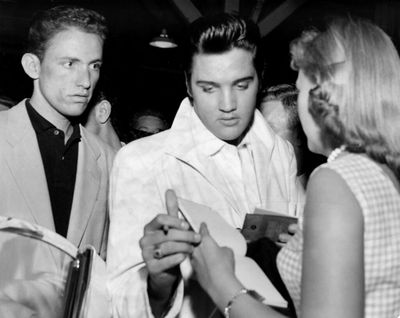Elvis has left the building, but he left an indelible mark at the Coliseum and Memorial Stadium

Even though Elvis Presley has been dead longer than he was alive, it feels as if the King is still present.
Presley reissues or live documents pop up annually, and every few years, there are films that focus on the life of the King. The latest, “Elvis,” is an uneven epic of a movie. The story is told from the perspective of the late Colonel Tom Parker (Tom Hanks), who managed Elvis.
“Elvis” director Baz Luhrmann excels with the sizzle but stumbles with substance.
Austin Butler is exceptional as Elvis with a performance right up there with Jonathan Rhys Meyer, who portrayed Presley in the 2005 film, also dubbed “Elvis.”
Neil Young nailed it when he wrote “The king is gone but he’s not forgotten” with “Hey Hey, My My.”
Fans have raved about Presley’s incendiary performances. However, many who experienced the early days of Presley live have left the building.
Presley made his Spokane debut Aug. 30, 1957, at Memorial Stadium, but it isn’t easy finding anyone who caught what must have been a mind-bending performance 65-years ago.
The 16-song set included such hits as “Don’t Be Cruel,” “Hound Dog” and “Heartbreak Hotel.”
Presley as a smoldering, hip-shaking 22-year-old must have been a sight to behold.
“It must have been incredible,” 4000 Holes record shop owner Bob Gallagher said. “Back then Elvis had his first two records out and that rockabilly stuff is just great. Elvis ushered in the rock and roll era as we know it. Back in his early days, he really had no competition. There were guys like Gene Vincent but we’re not talking household names.”
Much changed between Presley’s first Spokane show and his last in the Lilac City on April 27, 1976, at the Spokane Coliseum. The most iconic figure from the ’50s had drug problems, personal issues and an unrelenting schedule, thanks to his overbearing manager.
But Presley delivered at the Coliseum, aka the Boone Street Barn, less than 16-months before he passed away.
Lorrie McLaughlin, 65, who worked the Coliseum concession stands witnessed the entirety of Presley’s final local performance.
“I wasn’t a screaming maniac of an Elvis fan, but I liked Elvis,” McLaughlin said. “Elvis put on a great show, but I found it humorous that most of the women who went to the show wore gowns with their hair piled up on their heads as if they were going to a gala. It was so hot in the Boone Street Barn since there was no air conditioning since the city never wanted to pay for it.”
Female fans clamoring for a sweat-soaked scarf from Presley amused McLaughlin. “These women that were decked out head to toe were doing all that they could to grab the scarves Elvis tossed into the crowd after he wiped his forehead. They would scream like they were little girls. That was so funny to me. But regarding Elvis, he could put on a show. He played to the crowd like no one else I saw at the Coliseum.”
McLaughlin saw virtually every act that performed at the dilapidated venue from 1972 -76, from Black Sabbath to John Denver.
“I was able to get into the Green Room for every show I worked except Elvis, who had his own security,” McLaughlin said. “I got to see the shows since my mother worked with me in concessions and she just let me go to watch the concerts.”
McLaughlin, who has lived in north Spokane for much of her life, visited Elvis’ home, Graceland, in Memphis a decade after Presley died and was surprised.
“I expected this massive mansion and it’s only about 3,000 square feet,” McLaughlin said. “It’s really interesting. The rooms were gaudy, as if an old lady lived there. I saw the room with 15 TVs in it that everyone talks about. Elvis apparently liked watching multiple TV shows at once. There was no one ever like Elvis.”
That is difficult to argue. Presley, as former President Jimmy Carter once noted, “permanently changed the face of American pop culture.”
Presley not only brought attitude to the game, he was viewed as dangerous, which is so rock and roll. “When he showed up in town, the city councils from many cities tried to stop him from performing,” Gallagher said.
The Tupelo native is the bestselling solo artist of all time, with more than 500 million Presley records have been sold. What is often overlooked is that Presley crossed over like very few other recording artists. Presley had hits on the pop, country, R&B, adult contemporary and gospel charts.
That stands out today since many artists and fans wear their genres on their sleeves as if they’re badges.
Much was made about the three-time Grammy award winner’s glitz, the jumpsuits, the array of rings and his endless eccentricities, but Presley was an interpreter, who took performance to another level.
“Liverpool Fantasy” is a play about the Beatles breaking up just after the release of their initial single in 1963. Written by former Black 47 singer-songwriter Larry Kirwan, posits that the world of music and the world never moved forward.
The same “what if?”can be applied to Presley. What if his career was short circuited? Presley influenced countless major players in the world of rock, most notably the Beatles.
“Before there was Elvis, there was nothing,” John Lennon once said.